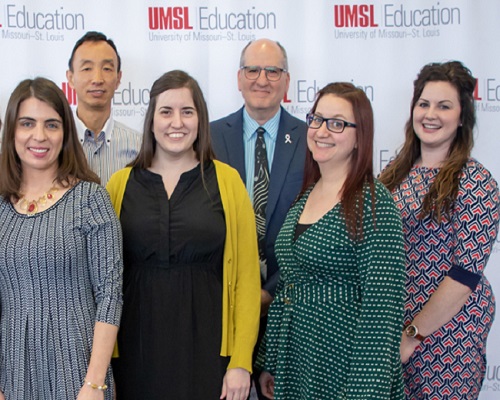Create a powerful and inclusive learning environment with a master’s in special education
Help students with disabilities reach their full potential with a master’s in special education from the University of Missouri–St. Louis.
Our MEd in Special Education teaches you proven strategies that spark engagement, unlock understanding and boost achievement. Through practical application, you can be the catalyst for transformative learning for every student.
Through our master’s in special education, you can focus your studies on three concentrations: Behavioral Principles and Interventions, Inclusive Education, and Transition Studies. Whichever specialization you choose, the UMSL master’s in special education equips you with the deepest expertise and most practical skills available in the St. Louis region.
Don’t just teach. Empower. Shape futures and leave a lasting impact on every student. The UMSL MEd in Special Education is your launchpad to a career that matters.
Unlock your leadership potential with a career in special education
Our MEd in Special Education is ideal for teachers, K–12 educators, specialists and advocates who want to ignite positive change for students with disabilities. Boost your career in special education with our three specializations:
- Behavioral Principles and Interventions: Learn how to understand behavior and design effective interventions. Assess student needs and create plans to address them, promoting academic and social success for all students.
- Inclusive Education: Become an expert in creating inclusive learning environments. You’ll graduate with the skills to advocate for evidence-based strategies and collaborate with families and professionals to support all students.
- Transition Studies: Prepare students with disabilities for a smooth transition beyond high school. This emphasis equips you to develop personalized plans, connect students with resources and evaluate options to ensure their success.
Program type:
Graduate, MEd
Format:
On-Campus, 100% Online
Take the next step
Request more information below:

Why earn your master’s in special education at UMSL?
An MEd in Special Education from UMSL equips you with the critical skills and knowledge needed to positively impact children with disabilities. You’ll dive into current research, analyze data and master best practices to create inclusive and effective learning environments where all students thrive:
- Unmatched expertise. Learn from faculty who actively shape careers in special education with the latest teaching methodologies.
- Practical applications. Hands-on experience in special education teacher jobs means you can make a difference, even before you graduate.
- Supportive community. Connect with like-minded educators who share your passion for working with students with disabilities and improving learning outcomes.
- Flexibility for working professionals. Our master’s in special education can be earned on campus or online. With an average of 2.5 years to completion, you can take courses full- or part-time.
What can you do with an MEd in Special Education?
Innovative and compassionate special education teachers are in high demand. Our master’s in special education provides you with the core knowledge and valuable hands-on experiences in the classroom to meet this need.
With an MEd in Special Education from UMSL, you’ll enter a high-demand field that’s rewarding both personally and professionally. Through a rigorous and relevant curriculum, you’ll be equipped to:
- Align IEP goals with grade-level standards, leveraging inclusive frameworks and fostering collaboration.
- Interpret rights, design individualized programs and collaborate with families for success.
- Apply knowledge of abilities/disabilities to create tailored learning experiences.
- Use assessments and evidence-based practices to personalize education.
- Advocate, collaborate and lead positive change in classrooms and communities.
Skills like these are beneficial to many special education teacher jobs, including elementary or secondary special education teacher, educational tester, independent consultant or trainer, behavior intervention specialist, director or program manager, and more.
Our master’s in special education also offers a platform for advanced study in the field, including a doctorate in special education, to provide the highest level of research-based methods and teaching tools that improve outcomes for all children.
Employment of special education teachers is projected to remain steady over the next decade, with a median annual salary of $62,950, according to wage and employment data from the U.S. Bureau of Labor Statistics.$62,950
0%
Career Opportunities
- Adult Basic, Literacy and Secondary Education Teacher
- Career and Technical Education Teacher
- Curriculum Developer
- Educational Administrator
- Educational Consultant
- Educational Program Planner
- Instructional Coordinator
- Post-Secondary Teacher
- Post-Secondary Administrator
- Special Education Teacher
- Textbook Writer
Admissions requirements include an earned baccalaureate degree from an accredited college or university with an overall grade point average of 3.0 or higher, a completed UMSL Graduate School Application, official transcripts from all colleges and universities attended and two letters of recommendation.
Application Deadlines
Fall - July 1, Spring - December 1, Summer - May 1
Download Program RequirementsPlan of study
Choose your emphasis
Behavior Principles and Interventions
Inclusive Education
Transition Studies
Non-Missouri Residents: Prospective students are responsible for reviewing the NC-SARA state authorizations page to see if this program is offered in their state throughout their program and to review the licensure or certification requirements for the state in which they reside.
Student Organizations - Make new friends and learn new skills by joining one of our Recognized Student Organizations.
Career Services – Students have access to professional career counselors who can assist in everything from resume development and interview preparation to lining up an internship or connecting you with your next fulltime career. UMSL alumni also enjoy high quality, lifelong career management programming, services, events and resources to assist in all phases of career development.
Networking – with the largest alumni network in the region, UMSL graduate students have access to leading professionals engaged in business, research, entrepreneurship, non-profit, government, community organizations. Our academic units engage this network in curriculum development to ensure our graduate students gain the skills needed to advance along their choose career path.
Research – There are many opportunities for graduate students to showcase their research including our annual Graduate Research Fair, which is open to students from all graduate programs. Doctoral and thesis master’s students can also compete in the Three Minute Thesis challenge to be evaluated by a panel of judges for a chance to win cash prizes.








